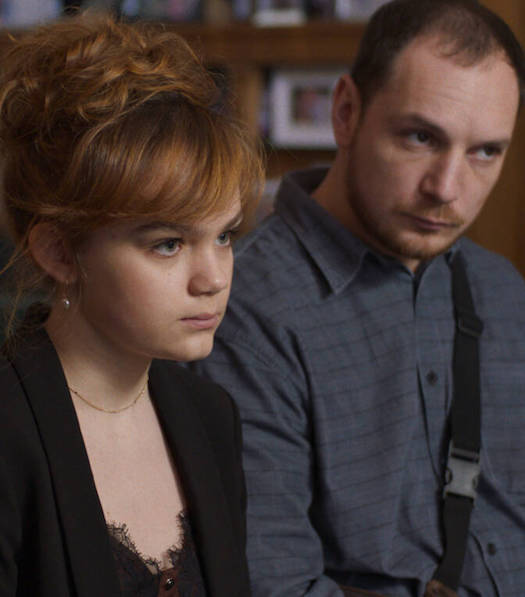What is it that drives Belgian filmmakers to make sad and disturbing films about children? Is it the influence of the Dardennes Brothers, who over a 20-year career have made superb features exploring how brutally society treats its most vulnerable (Tori and Lokita, The Kid with a Bike, The Child among others)?
My Belgian friend Anne-Marie Huby drily observes of her countrymen: “We are very adept at despair.” Is that it? Or is it that Belgian directors makes plenty of jolly action movies, costume dramas and romcoms but they just don’t win prizes at film festivals and hit the arthouse circuit in the UK? Whatever the reason, almost a year after the release of the Belgian film Playground, which immersed the audience in the perspective of two siblings ostracised and bullied at school, comes Love According to Dalva. The two films share a naturalistic, observational style and both films were made by first-time directors, who have coaxed extraordinarily powerful performances out of their child actors.
We first meet 12-year old Dalva (Zelda Samson) at night when the police burst into the home she shares with her father. When they arrest him, she calls out his name, Jacques (Jean Louis Coulloc’h), rather than papa. It’s the first indication that something is amiss in their relationship. After being examined by a white-coated woman for physical evidence of sexual abuse, Dalva is taken to a children’s shelter. It transpires that the child has been missing since she was five. Her father kidnapped her and home-schooled her, changing address repeatedly.
She cuts an unusual figure in the children’s home, which is filled with young people whose families have failed to care for them. With her long, dyed hair piled up in a neat chignon, Dalva wears full make-up and the kind of outfits you’d expect to see on an adult woman wanting to make a ladylike impression. She seems much older than her years and tells the adults around her that she wants more than anything to be reunited with her father. Her new room-mate, Samia (Fanta Guirassi) has been placed in the home because her sex-worker mother wanted to put her on the game. Initially dismissive of Dalva, with her seemingly superior airs and enduring love for her father, Samia warms to her over the course of the film but not before some clashes. Newly immersed among peers her own age for the first time not only in the children's home but at a new school, Dalva has to negotiate the callous curiosity of other youngsters, reminiscent of the torments experienced by the young leads in Playground.
In interviews, Belgian writer-director Emmanuelle Nicot has described how she researched this, her debut film, by spending time in emergency reception centres dealing with abused children. She also talked to a friend’s father, a teacher who realised that one of his pupils, a six-year-old girl living alone with her father, was highly sexualised. I have no criticism of the sincerity of Nicot’s intentions, she has made a film that shows the devastating damage done to a child’s sense of self when love for a parent is distorted by that adult’s incestuous abuse. But I found myself wishing that the camera didn’t dwell so much on how attractive Dalva is. There is nothing explicit on screen, this is no dodgy Lolita or Pretty Baby, but still, the lengthy close-ups of a child in full make-up and lacy costumes provoked in me the same queasy feeling I have about the lingering adult gaze in the recent arthouse hit, Close which dwelt on the beauty of two pre-pubescent male actors.
 I also wished that there had been less time spent on the complex relationship Dalva develops in the children’s home with her key worker, Jayden, played by Alexis Manenti (pictured left) who brings some of the aggression and energy he deployed as a corrupt policeman in the brilliant Les Misèrables. I would have preferred instead longer sessions with a therapist to be shown on screen. I longed to see trained professionals help Dalva and her mother (Sandrine Blancke) come to terms with what has happened to them rather than dramatic fireworks with Jayden.
I also wished that there had been less time spent on the complex relationship Dalva develops in the children’s home with her key worker, Jayden, played by Alexis Manenti (pictured left) who brings some of the aggression and energy he deployed as a corrupt policeman in the brilliant Les Misèrables. I would have preferred instead longer sessions with a therapist to be shown on screen. I longed to see trained professionals help Dalva and her mother (Sandrine Blancke) come to terms with what has happened to them rather than dramatic fireworks with Jayden.
And like last year’s more didactic film, La Mif, set in a Swiss children’s home, the representations of race seem inadequately considered. Was it necessary in Love According to Dalva to describe Samia, played by a young black actress, as a pitbull? Or cast another adolescent male actor, clearly of mixed heritage, as the one who makes a predatory sexual overture at the children's home to Dalva? He's physically reprimanded by white male saviour Jayden. The ascribing of precocious sexual maturity to children of ethnic origin in white European society is a shameful, damaging phenomenon and one that this film fails to address. The Dardennes brothers' Tori and Lokita, also partially set in a children's home, had a far more nuanced approach to racism. Because of these instances of what is undoubtedly unconscious bias rather than anything more pernicious, it’s difficult to wholeheartedly praise Love According to Dalva, despite the director’s sensitive portrayal of abuse and trauma and Zelda Samson’s outstanding performance in the leading role.















Add comment